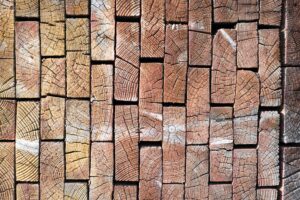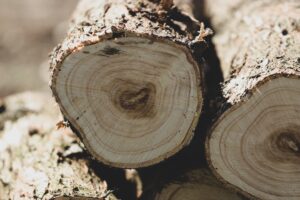Feature: Russia’s invasion of Ukraine creates timber supply chain challenges for construction
Sanctions and shortages highlight the urgent need to invest in UK timber manufacturing for future housing construction, finds Kirsty Connell-Skinner.
Russia’s invasion of Ukraine is likely to cause ‘huge disruption’ to EU and UK timber supplies, following an already-turbulent period of record demand and rocketing prices for timber products across Europe throughout the Covid-19 pandemic.
Although few manufactured timber products are imported directly into the UK from the warzone, shortages across the continent will intensify competition for already limited wood supplies – increasing prices and reducing the likelihood of meeting net-zero targets through growing the use of timber in construction.
‘Beyond the human tragedy that this conflict is causing, the European timber industry will be negatively affected by a shortage of wood products,’ said Silvia Melegari, Secretary-General of CEI-Bois, the main European organisation for the timber and woodworking industry.
PEFC, the international NGO promoting third-party certification of wood, now labels all timber originating from Russia and Belarus as ‘conflict timber’, forbidding its use in PEFC-certified products. Likewise, the Forest Stewardship Council (FSC) has suspended all trading certificates in Russia and Belarus, blocking all controlled wood sourcing from the two countries.

Earlier this month, Timber Development UK advised British timber suppliers to cease trading with Belarus and Russia.
Timber Development UK CEO David Hopkins said, ‘This will, of course, cause huge disruption to timber supplies into Europe and to the UK market. While direct imports into the UK are relatively small, Russia and Belarus account for about 10% of the softwood market in Europe. Removing this will make the available supply even tighter.’
Softwood as a raw material is critical for joinery in construction, including skirting, flooring, and mouldings in housing.
In 2021, Ukraine exported more than 2.7 million m3 of sawn softwood timber and produced and exported an estimated 15 million pallets, mostly to Europe.
Multiple critical industrial supply chains are now affected by this timber trade ban. Food and medicine are logistically based on wooden pallets. A shortage of sawn softwood will increase demand for supplies from Scandinavia, but there is already little spare capacity. Last summer, Swedish softwood stocks hit a twenty-year low, prompting a 20% price jump in one month.
Brian Berry, chief executive of the Federation of Master Builders (FMB), said: ‘As a result of Russia’s actions, supply chain disruption and the reallocation of certain types of materials will intensify the situation, with oil, steel, aluminium, timber and copper all set to be some of the worst affected.
‘At a time when costs are surging, it puts builders in the unenviable position of having to raise costs for a customer base that are tightening their belts.’
Reduced supply and increased costs for timber materials will not only affect the UK construction industry in the short-term. Decreasing the attractiveness of timber as a raw material could also delay ambitions to decarbonise the built environment.
Industry analysis suggests that 85% of new Scottish housing is built with a timber core. In England and Wales, timber-frame and engineered wood systems account for between 15 to 28% of new housing materials. Yet, despite over 13% of the UK being woodland, we remain the second-largest global importer of forest products in the world behind China.
Multiple factors, including overspecification in design, lack of active forest management, and historic use of UK timber for non-structural applications, has led to this overdependence on imported stock.
That is why a new industry-led programme in Scotland – Transforming Timber – has £1.4M funding from Innovate UK’s Small Business Research Initiative to explore the potential for homegrown mass timber in construction.
Mass timber is formed of multiple solid wood panels nailed or glued together, providing exceptional strength and stability. It is a strong, low-carbon alternative to concrete and steel, with significant potential to sequester carbon.
Led by the Construction Scotland Innovation Centre (CSIC) with partners including EcoSystems Technologies and Edinburgh Napier University, Transforming Timber created a fully functional two-storey, two-bedroom timber demonstrator home – displayed at the UN Climate Change Conference in Glasgow – to highlight the business case for using Scottish-grown mass timber products for future home building.
According to Sam Hart, Innovation Manager at CSIC: ‘There is a huge opportunity for the greater use of renewable Scottish timber in UK construction and research has proven that with the right treatment and processing, it can be used for a wide range of structural elements.’
Increasing the use of homegrown timber could significantly lower costs for the UK construction industry. Initial figures suggest a potential decrease of as much as 10% compared to imported cross-laminated timber products. It could also lessen carbon emissions through the reduced need for transportation.
A recent study by Edinburgh Napier University estimated that over the next 30 years, substituting concrete floor slabs with timber in steel building frames could avoid up to 50 megatons of upfront greenhouse gases or carbon dioxide equivalent.
At this stage there is no easy switch from Europe’s dependence on Russian supplies. The promise of fully exploiting homegrown timber for construction in the UK will take time and effort, plus government support.
At present there is no major manufacturing facility in Britain for mass timber; a multi-million-pound investment would be required, plus a lead-in time of three or more years before such a plant could be fully operational.
Nonetheless, action now to increase the use of UK timber could address future global shortages and price fluctuations, like those experienced today with the Russian invasion of Ukraine.
According to Sam Hart, ‘Timber is a naturally renewable, low embodied carbon material and removing the need to transport it from abroad could cut its carbon footprint even further.’
The cost of Russia’s aggression in Ukraine is already incalculable on a humanitarian level. It’s hard to imagine the UK wishing to return to depend on raw material supplied by such an aggressor.
However, without imagination and investment in the UK’s own timber manufacturing capabilities, Russia’s actions today could provoke lasting untold harm to our sustainable housing future.
Photos by kindfolk and Em M.
















